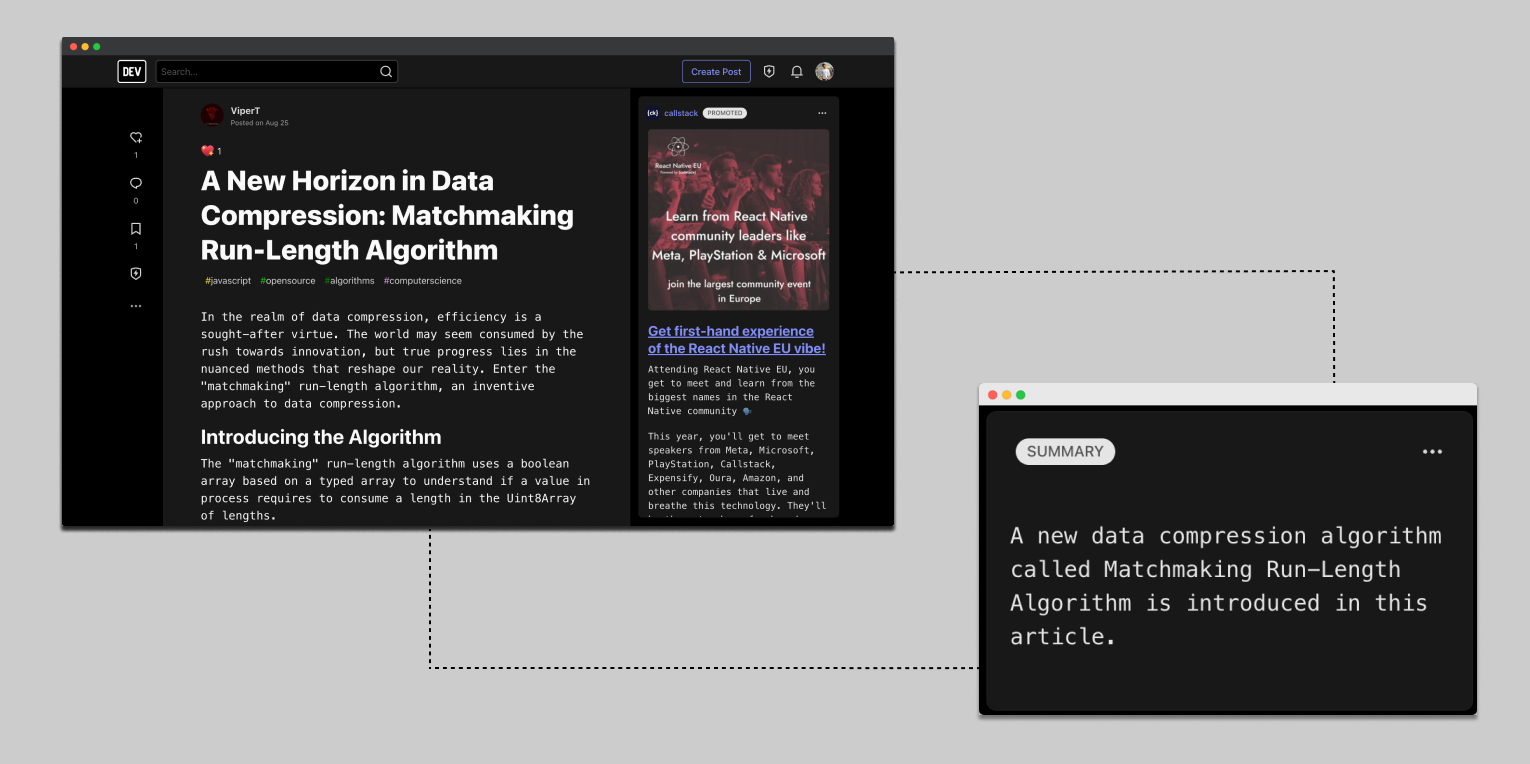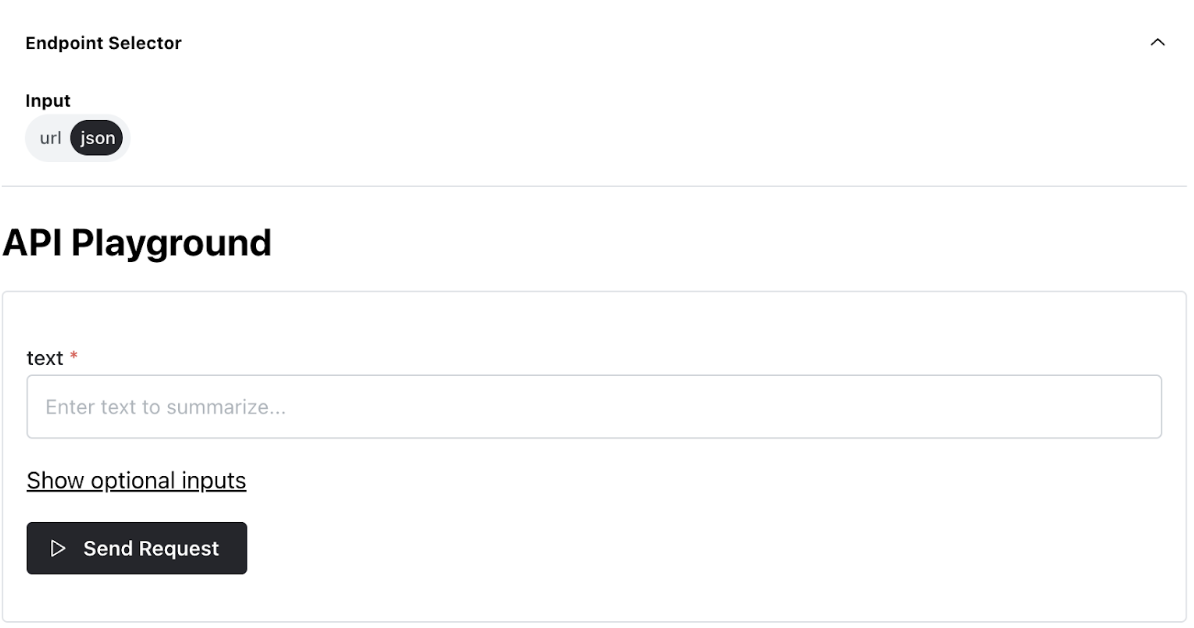Engineering
How AI Automates Text Summarization: A Developer’s Guide to Using APIs in 2025
Discover how AI-powered APIs automate text summarization, saving time and boosting efficiency. Learn common use cases, multilingual support, and developer tools.
MA
Maria Hayat
Last updated on August 25, 2023
Using AI to Automate Text Summarization with an API
Introduction
With the wealth of information and online content available, being able to quickly get useful insights and key information from long documents or even web content can prove to be quite a useful tool across many different applications and industries.
AI models can help in automating text summarization, using advanced machine learning techniques, making it much easier to process information.
The Advantages of AI-Powered Summarization
Time Efficiency: Condensing Complexity in Seconds
One of the most prominent advantages of utilizing AI for text summarization is the incredible time efficiency it brings to the table. While we would generally require a lot of time to read, make sense of and then summarize lengthy documents, AI tools can perform the same task in just seconds.
Rapid Information Access: Navigating the Flood of Information
Summaries generated by AI allow users to bypass the need to sift through entire documents or web pages. Instead, they gain instant access to the core takeaways and key points, facilitating efficient decision-making and reducing information overload.
Scalability: From Singular to Multiple Summaries
The scalability of AI-powered text summarization is a game-changer, particularly in scenarios that involve handling a vast volume of documents simultaneously. Whether it's a research project requiring analysis of numerous papers or a market analysis task involving multiple reports, AI can seamlessly process and summarize copious amounts of data concurrently.
Consistency: Unbiased and Reliable Summaries
When human summarizers are involved, the risk of introducing biases or inconsistencies is inherent. AI-powered summarization tools, however, provide a consistent approach to extracting essential information. By adhering to predefined algorithms, these tools eliminate subjective interpretations and ensure reliable results that remain impartial across the board.
AI Summaries: Objectivity and Enhanced Reading
Generating Objective Summaries
Human summarizers often bring their own perspectives and biases into the summary creation process. However AI summaries can be quite factual, which can be quite useful when you're dealing with sensitive or controversial content, and need to eliminate personal bias as much as possible.
Enhanced Reading Efficiency: Prioritizing Relevance
AI-generated summaries can also act as invaluable filters. They offer a glimpse into the content's essence, helping users swiftly gauge whether the full document warrants a closer read. This empowers individuals to prioritize their reading list and allocate time to the materials that truly matter.
Unlocking Multilingual Capabilities and Key Insights
Language Translation: Bridging Global Communication
AI-powered summarization tools possess the remarkable ability to transcend language barriers. By not only summarizing but also translating documents, they help information reach a global audience. This feature is pivotal in today's interconnected world, enabling effective communication and collaboration across diverse linguistic backgrounds.
Extracting Key Insights: Informed Decision-Making
Deciphering complex documents can be a daunting task, but AI-generated summaries simplify the process by highlighting the most crucial insights. Decision-makers no longer need to delve into every detail; they can grasp the main ideas, trends, and implications swiftly, making well-informed choices without the burden of exhaustive reading.
Empowering Learning, Analysis, and Resource Management
Training and Learning: Navigating Educational Challenges
In educational settings, AI-generated summaries offer a novel way to enhance learning experiences. Students grappling with intricate subjects can benefit from clear and concise summaries that distill complex concepts. These summaries act as stepping stones, aiding comprehension and facilitating more effective studying.
Data Mining and Analysis: Unveiling Patterns and Trends
For researchers and analysts, AI-driven text summarization can be a powerful tool for data mining and analysis, to generate automatic summaries. By swiftly identifying patterns, trends, and correlations within a vast dataset of documents, these tools expedite the process of drawing meaningful insights and actionable conclusions.
Resource Optimization: Efficient Decision-Making
In professional environments, where time is often a scarce resource, AI-generated summaries can enable resource optimization. Professionals can swiftly review documents, reports, and studies, making well-founded decisions without dedicating extensive hours to reading. This agility in decision-making can drive operational efficiency and competitiveness.
Personalization, Accessibility, and Looking Ahead
Personalization: Tailoring Summaries to Individual Needs
AI-powered text summarizers can evolve over time to align with individual preferences. By understanding user interests, habits and requirements, these tools can generate personalized summaries that cater to specific needs, further enhancing the efficiency and targeting of information consumption.
Accessibility: Inclusivity in Information Consumption
Summaries have the power to democratize information access. Individuals with limited time, attention spans, or reading capabilities can still benefit from valuable insights of a blog or an article or book. AI-generated summaries ensure that vital information reaches a wider audience, promoting inclusivity in knowledge dissemination and sharing.
Using the ApyHub AI Summarize API
To quickly, and programmatically summarize text and documents using AI, within your application, the ApyHub AI Summarize API can come in handy.
The AI Summarizer API efficiently generates concise summaries from large text datasets or entire webpages. Users can input a text document directly or submit a URL. This text summarization API supports summary outputs in multiple languages, making it a practical tool for content management and natural language processing tasks.
This summarization API can also be tested right within the browser using the API Playground feature. You can simply input a URL or a JSON file to summarize, using an API key:
Conclusion
The adoption of AI to automate text summarization marks a pivotal advancement in information processing and decision-making. The numerous benefits it offers, ranging from time efficiency and rapid information access to scalability and enhanced reading, have the potential to reshape various industries. As AI continues to evolve, so too will the capabilities of automated summarization tools.
FAQ: Using AI to Automate Text Summarization with an API
Q1: What is AI-powered text summarization?
AI-powered text summarization uses machine learning models to automatically generate concise versions of longer texts, extracting the most important information while preserving the original meaning.
Q2: Why should developers use AI for text summarization?
AI dramatically speeds up the process of digesting lengthy content, enabling quicker insights, reducing information overload, and allowing for scalable summarization of multiple documents simultaneously.
Q3: How accurate are AI-generated summaries compared to human summaries?
While human summaries can include subjective bias, AI-generated summaries focus on factual, consistent extraction of key points, ensuring impartiality and uniform quality across summaries.
Q4: Can AI summarization handle documents in multiple languages?
Yes, many AI summarization tools, including APIs like ApyHub’s AI Summarize API, support multilingual summarization and can even translate content, facilitating cross-language communication.
Q5: What are common use cases for AI text summarization in software development?
Typical applications include automating documentation summaries, summarizing research papers or market reports, generating concise news briefs, and streamlining educational content for easier study.
Q6: How can AI summaries improve decision-making?
By quickly highlighting key insights and trends, AI summaries help professionals and decision-makers focus on relevant information without needing to read entire documents in detail.
Q7: What types of inputs do text summarization APIs accept?
Most APIs, including ApyHub’s, can accept raw text, Markdown or JSON files, and URLs pointing to web pages or documents for summarization.
Q8: How do AI summarization APIs handle privacy and security?
Reputable API providers implement strong security measures to protect data privacy, ensuring submitted content is processed securely and not stored or shared without consent.
Q9: Can AI summarization tools be customized or personalized?
Yes, advanced AI tools can adapt to user preferences and generate personalized summaries tailored to specific interests or requirements.
Q10: Is there a free plan available for using ApyHub’s AI Summarize API?
Yes, ApyHub offers a free tier with limited usage, allowing developers to test and integrate the summarization API into their projects without upfront costs.
Q11: How can developers test the AI Summarize API before integrating it?
ApyHub provides an API Playground where developers can input text or URLs to generate summaries instantly, making it easy to evaluate the API’s capabilities.
Q12: What are the limitations of AI text summarization?
While AI summaries are highly efficient, they may occasionally miss subtle context or nuances, so human review is recommended for critical documents.

